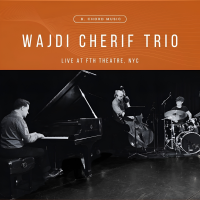
He's conducting an all-star band, featuring the likes of Antonio Hart, Luis Bonilla, Renee Rosnes, Lewis Nash and Peter Washington. Yet the star of the show on Gerald Wilson's brilliant new release remains his adopted hometown of Chicago.
Legacy, due on Tuesday from Mack Avenue Records, actually opens with five ingeniously performed ensemble pieces, each boasting the coloring and dexterity of the best small-band jazz outings. That includes a trio of historical pieces, each of which has been transformed into a swinging variation that you'd never peg as classical. There's Stravinsky's “The Firebird," presented as a rumbling introductory blast of brass; this greasy blues update of Debussy's “Claire de Lune" and then a smooth and slinky rendition of Puccini's “Nessun Dorma."
Of course, that's not the only legacy that this longtime trumpeter, composer, arranger and band leader investigates here. There's a strong family connection, too: Wilson's son Anthony, a cunningly lyrical guitarist, contributes the cool and collected “Virgo"; while his grandson Eric Otis—son of 1970s soulster Shuggie Otis and grandson, as well, to R&B pioneer Johnny Otis—orchestrated the melancholy wonder of “September Sky." (The younger Otis transcribes Gerald Wilson's works these days, as a case of macular degeneration has dimmed the eyesight of this remarkably vibrant 92-year-old.)
The heart and soul of the record, however, comes next. Wilson concludes Legacy with a suite called “Yes Chicago Is ..." consisting of seven movements based on the same melody. Wilson's insistent yet limber group manages to infuse each of them with indelible changes in tempo, harmony, tone and feel—until it becomes this stirring echo of his own changing relationship with the city. A Mississippi native, Wilson previously lived in Chicago as a teen, then returned in the late 1930s as a member of the Jimmie Lunceford Orchestra. He also used the Windy City as a home base while stationed at the Great Lakes naval facility during the early years of World War II.
In keeping, there are memories both sweeping and touchingly personal to be found here, each presented with a pianistic touch that belies Wilson's long-ago studies at the keyboard. Whereas so much of big band jazz can come off as rote, practiced until it becomes second nature and stale, there's a rhythmic proximity, a block-chord brilliance, that makes every thing feel so immediate with Wilson's work.
The bustling “Jazz Mecca," which opens the suite, sets a tone of fast-paced astonishment, as alive and vibrant—as present—as the day Wilson first set foot on Chicago's legendary Michigan Avenue. “A Night at El Grotto" recalls a series of evenings, almost 65 years ago now, that Wilson played in the Windy City club of the same name. He cheers on the local sports clubs with “Cubs, Bears, Bulls and White Sox."
“Riffin at the Regal" pays homage to one of the great showcase stages for big bands, second perhaps only to the Savoy Ballroom. The grittier “47th St. Blues" gives a tip of the hat to Chicago's juke joints. Wilson then puts a bow on his lovingly composed, unforgettably performed bouquet with “A Great Place To Be," a new romantic anthem for the city.
Legacy, due on Tuesday from Mack Avenue Records, actually opens with five ingeniously performed ensemble pieces, each boasting the coloring and dexterity of the best small-band jazz outings. That includes a trio of historical pieces, each of which has been transformed into a swinging variation that you'd never peg as classical. There's Stravinsky's “The Firebird," presented as a rumbling introductory blast of brass; this greasy blues update of Debussy's “Claire de Lune" and then a smooth and slinky rendition of Puccini's “Nessun Dorma."
Of course, that's not the only legacy that this longtime trumpeter, composer, arranger and band leader investigates here. There's a strong family connection, too: Wilson's son Anthony, a cunningly lyrical guitarist, contributes the cool and collected “Virgo"; while his grandson Eric Otis—son of 1970s soulster Shuggie Otis and grandson, as well, to R&B pioneer Johnny Otis—orchestrated the melancholy wonder of “September Sky." (The younger Otis transcribes Gerald Wilson's works these days, as a case of macular degeneration has dimmed the eyesight of this remarkably vibrant 92-year-old.)
The heart and soul of the record, however, comes next. Wilson concludes Legacy with a suite called “Yes Chicago Is ..." consisting of seven movements based on the same melody. Wilson's insistent yet limber group manages to infuse each of them with indelible changes in tempo, harmony, tone and feel—until it becomes this stirring echo of his own changing relationship with the city. A Mississippi native, Wilson previously lived in Chicago as a teen, then returned in the late 1930s as a member of the Jimmie Lunceford Orchestra. He also used the Windy City as a home base while stationed at the Great Lakes naval facility during the early years of World War II.
In keeping, there are memories both sweeping and touchingly personal to be found here, each presented with a pianistic touch that belies Wilson's long-ago studies at the keyboard. Whereas so much of big band jazz can come off as rote, practiced until it becomes second nature and stale, there's a rhythmic proximity, a block-chord brilliance, that makes every thing feel so immediate with Wilson's work.
The bustling “Jazz Mecca," which opens the suite, sets a tone of fast-paced astonishment, as alive and vibrant—as present—as the day Wilson first set foot on Chicago's legendary Michigan Avenue. “A Night at El Grotto" recalls a series of evenings, almost 65 years ago now, that Wilson played in the Windy City club of the same name. He cheers on the local sports clubs with “Cubs, Bears, Bulls and White Sox."
“Riffin at the Regal" pays homage to one of the great showcase stages for big bands, second perhaps only to the Savoy Ballroom. The grittier “47th St. Blues" gives a tip of the hat to Chicago's juke joints. Wilson then puts a bow on his lovingly composed, unforgettably performed bouquet with “A Great Place To Be," a new romantic anthem for the city.


























